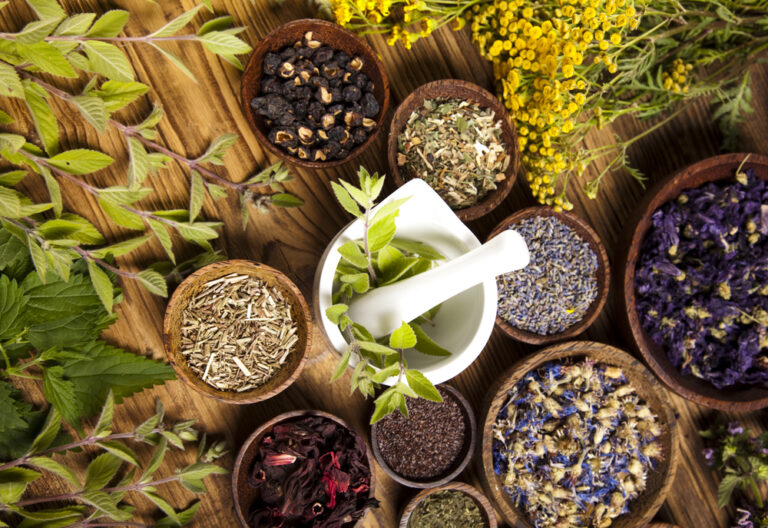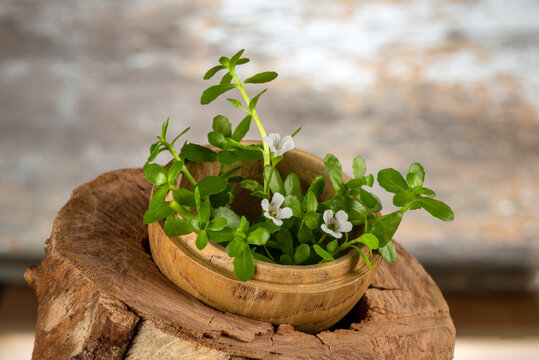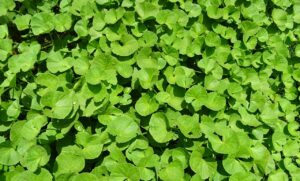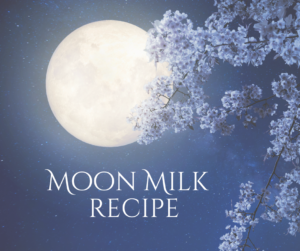
Plants who are the Queens of the Soma, manifold, with a hundredfold perceptive power. I take you as the best for the fulfillment of the heart’s desire. Plants who are the Queens of the Soma, spread over all the Earth, generated by the Divine Father, may you impart vigor to this herb.
Rig Veda X.97.18-19
What are adaptogens?
Adaptogens are bioactive substances derived from naturally occurring plants. They are completely natural and work in harmony with our systems, do not release any toxic effects upon consumption and are highly beneficial in shielding the body when exposed to external stress, by maintaining homeostasis.
These powerful herbs have been used for centuries in traditional therapeutic medicines and were documented in the ancient Ayurveda texts as well as Traditional Chinese Medicine (TCM).
They are becoming more popular and known in the Western world due to their ability to help support and relieve many health conditions, in particular they are beneficial in supporting mental health of those suffering with stress, anxiety, depression, panic attacks, insomnia.
Common examples of adaptogens as mentioned in the texts of Ayurveda – Charaka Samhita, Sushruta Samhita, Ashtanga Hridaya, consist of ashwagandha, shankapushpi, brahmi, shatavari, gotu kola, aparajitha,Kaunch beej, gokshura and tulsi, as well as many other potent herbs.

How can Adaptogenic Herbs Help with Stress Relief?
In a healthy person, in ideal circumstances, the body is ideally in a balanced internal condition of homeostasis (equilibrium). Homeostasis refers to the stable state of living organisms, characterised by steady internal physical, chemical and biological settings, even amidst fluctuations in the environment. Under these circumstances, the functioning of the system is optimal, with normal body temperature, hormone levels and fluid balance. However, our systems are sensitive and the equilibrium can become unbalanced when the system endures stresses from the external environment – for example resulting in an increase in the stress hormone cortisol from adrenal glands.
This in turn will have a knock-on effect on almost every organ in the body, including the nervous system, brain, heart, lungs, stomach, kidneys, liver, reproductive organs, metabolism, and immune functions.
During times of stress, adaptogens can positively influence the hypothalamus in the brain, pituitary gland, and adrenal glands, to enhance stamina, bolster immunity, elevate nerve responses, lower cortisol, stress levels and increase the optimal functioning of the system again. They work in synergy with our own systems, adapting accordingly to counteract the imbalances – hence the name “adaptogens”.
Outlined Here are Five Common Ayurvedic Adaptogenic Herbs used in Ayurveda and Their Associated Health Benefits:-

Ashwagandha – Scientific name: Withania somnifera, also commonly known as Indian Winter Cherry. Is known as the “king of herbs” in Ayurveda and helps in rapid cell regeneration and rejuvenation that in turn helps in delaying signs of ageing, especially pertaining to the skin. Added benefits of this herb are its mood enhancing properties, and is often taken to help overcome anxiety and depression. It is known to help reduce and balance cortisol levels, therefore helping to relieve stress and anxiety and also aiding in improving sleep.
It is also known for its strengthening, rejuvenating and immunity boosting properties. It is helpful when recovering from illness to give the system a boost. This herb helps to balance Vata dosha.
Ashwagandha is known for its heating quality, and for this reason should not be taken on an empty stomach. Also those with Pitta dosha or imbalance should consider this before taking and seek advice as necessary.
Ashwagandha is safe when taken in the short term (up to 3 months). As advised above the 14 day on and 14 day off rule should be applied.
* Ashwagandha should be avoided during pregnancy and should not be used while breastfeeding.
* There is evidence that ashwagandha may, in some cases interact with some medications, including those for diabetes and high blood pressure, medicines that decrease the immune system response (immunosuppressants), sedatives, anti-seizure medications (anticonvulsants), and thyroid hormone medications.
* In some cases ashwaghanda is not recommended for women with Poly Cystic Ovarian Syndrome (PCOS)

Shatavari – (Scientific name:- Asparagus racemosus) Is a member of the asparagus family and is known as the “queen of herbs” in Ayurveda. It is an important herb for women’s health, monthly cycle, hormone balance throughout life, pre and post-menopausal. It is also beneficial for women who have just given birth as it also promotes healthy lactation.
In Sanskrit, shatavari means “the plant with hundred roots” – and it is the roots of the plant that contain the medicinal properties that are used in Ayurvedic medicine. Some scriptures also refer to the plant as “one with a hundred husbands” since it is extremely beneficial for enhancing womens’ overall health and libido.
Being a powerful adaptogenic herb, it not only relieves one from physical and emotional stress but also manages diabetes mellitus, prevents high cholesterol and triglyceride levels, and helps in the treatment of bacterial and fungal infections, oedema, infertility, digestive issues, depression and cancer.
It has sweet, bitter and heavy properties making it helpful in balancing and pacifying Pitta and Vata doshas, however it may aggravate Kapha.
Sticking to the recommended dosage of ½ teaspoon of powder, or one 500mg tablet/ capsule consumed twice a day, mixed with milk, is recommended and no longer than 14 days to one month consecutive days on following by a break of the same period, to ensure its effectiveness.
People that have allergies to the asparagus plant family should avoid consuming Shatavari formulations. These allergic reactions may manifest in the form of rashes, itchy eyes & skin, dizziness, fast heart rate or worsening of asthma symptoms.
Both Ashwagandha and Shatavari are powerful Rasayana dravyas (especially nourishing and immunity boosting) and can be taken together for building strength, immunity and stamina. While Ashwagandha works to build strength, Shatavari supports overall sexual health, womens wellness and libido. Together, both herbs assist in enhancing stability and sexual health. Additionally, being a Vata pacifier, Ashwagandha helps to calm the mind and relieve mental stress which in turn helps Shatavari to enhance sexual wellness and reproductive health.

Brahmi (Scientific name:- Bacopa monnieri, also commonly known as Water Hyssop) – This herb is commonly used to treat anxiety and has powerful antioxidant properties. It has many other health benefits which include:- It helps reduce blood sugar levels and can help support diabetic patients; it helps to boost immunity; improves skin health; it may help those with respiratory difficulties; helps to ease symptoms of gout and arthritis; It can help treat insomnia; Can help improve some mental disorders; supports cognitive functioning; Helps to treat epilepsy.
One of the most well known and documented benefits of brahmi is its ability to stimulate the mind, particularly in terms of memory and concentration. It has long been used in Ayurvedic medicine to increase focus and increase retention.
Some of the organic compounds in brahmi stimulate cognitive pathways in the brain to boost cognitive ability and bring mental clarity. It has the ability to reduce the onset of cognitive disorders as we age, such as dementia and alzheimers disease. It is also said to help ease other forms of mental dis-ease, including bipolar disorder and neuralgia.
Respiratory Benefits:-
When brahmi is brewed in a tea or chewed as normal leaves, it can help improve respiratory health. It has been used in Ayurvedic treatments for bronchitis, congestion, chest colds and blocked sinuses. It can help to clear out excess phlegm and mucus and relieve inflammation in the throat and respiratory system.
Boosts Immunity:-
Brahmi is known to help boost the immune system. The nutrients and antioxidant compounds contained within Brahmi help to increase the response time of our immune system against pathogens, viruses, or bacterial infection.
Treats Epilepsy:-
The leaves of brahmi have been used as a treatment against epilepsy for thousands of years. This is thought to be due to the effect brahmi has on the neural pathways, and it helps to prevent and also reduce the frequency and duration of epileptic seizures.
Supports Healing Process for Healthy Skin:-
Using brahmi juice or oil on the affected area , speeds up wound healing and disinfect the skin. It can reduce the appearance of scarring and leave you with smooth, healthy skin enriched with its natural essential oils.
Reduces Blood Sugar Levels:-
Brahmi is known to help regulate the blood sugar levels in patients with diabetes and may help improve symptoms of hypoglycemia.
Anti-Inflammatory
Brahmi can be a great remedy that provides relief from arthritis, gout and other inflammatory conditions. It also helps in soothing gastric ulcers and treating irritable bowel syndrome (IBS).
Helps Treat Insomnia and Supports Mental stress and tension:-
Massaging the scalp with Brahmi oil helps to overcome sleep disorders, which in turn can help overcome depression, anxiety, tension and stress. It is recommended that to help with these conditions one should massage the head every night with this oil. It is also helpful with hyperactive children too.
Brahmi can help to balance all three doshas – Vata, Pitta & Kapha.
Recommended dosage:-
Powder- ¼-½ teaspoon twice a day.
Brahmi Capsule – 1-2 capsules twice a day.
This herb should be taken before or after food – lunch and dinner.
Brahmi is well-tolerated by the most people and is considered safe, however it may cause side effects for some people. It may cause digestive issues for some.
Those with low blood pressure and a reduced heart rate may experience dizziness, headache, and fainting, therefore it is not recommended for those with these conditions.
Furthermore, Brahmi is not recommended for pregnant or breastfeeding women, as no studies have yet assessed the safety of its use during pregnancy or lactation.
Finally, it may interact with certain medications, including amitriptyline, a medication used as an antidepressant and for pain relief.
If you are taking any medications, speak with your healthcare provider or Ayurvedic physician before taking this herb.

Gotu-Kola (Scientific name:- Centella asiatica – also known as Indian Pennywort)
This herb is rich in flavonoids with antioxidant activity that helps protect the skin and body making it an extremely powerful anti-ageing herb. It can help increase concentration and improve cognitive function.
It may help ease symptoms for those with Alzheimer’s disease. It may also help reduce anxiety, stress and depression.
It has cooling properties, and is therefore good for pitta dosha.
Promotes liver and kidney health, by having a detoxing effect.
Reduces high blood pressure and inflammatory conditions associated with pitta dosha imbalance such as ulcers, hyperacidity, inflammation of the skin conditions such as eczema, psoriasis and acne.
Can reduce hair fall, and increase hair growth.
It may also help with healing of the skin – promoting wound healing, reducing stretch marks and scarring.
Possible side effects and risks:-
Gotu kola is generally well tolerated. In some cases, it can cause headache, upset stomach, and dizziness. Starting with a low dose and gradually working up to a full dose can help reduce your risk of side effects.
You should only take gotu kola for two to six weeks at a time. Be sure to take a two week break before resuming use.
When applied topically, gotu kola has the potential to cause skin irritation. You should always do a patch test before moving forward with a full application.
Avoid gotu kola if you:
- are pregnant
- are breastfeeding
- have hepatitis or other liver disease
- have a scheduled surgery within the next two weeks
- are under 18 years of age
- have a history of skin cancer
Talk to your doctor before use if you:
- have liver disease
- have diabetes
- have high cholesterol
- are taking medications such as sedatives for sleep or anxiety
- are taking diuretics

Tulsi, also known as “Holy Basil (Latin name:- Ocimum tenuiflorum) – Is another immunity boosting herb. It has a multitude of health benefits, largely due to the Eugenol – a phenolic compound found in the oil of the leaves – which is widely known for its healing properties – namely antimicrobial, anticancer, antioxidant, anti-inflammatory, and analgesic.
Tulsi is an effective treatment for: Asthma, bronchitis, fever, colds, congestion, coughs, flu, fever, sinusitis, sore throat and similar ailments. High blood pressure and high cholesterol. Headaches, earaches, and eye disorders.
Some of the main benefits of Tulsi are:-
Helps Reduce Stress: Reduces the stress hormone cortisol in your system and modulates the natural “happy” chemical messengers in your body— serotonin and dopamine.
Increases Immunity: Fortifies the immune system’s first line of defence by increasing the number of fighter cells— white blood cells. Also increases the T helper cell population.
Supports Liver Health: Protects the liver from cadmium exposure by binding to cadmium. Also stabilizes the liver membrane.
Helps maintain healthy blood sugar levels: Helps your pancreas produce more insulin, thus stabilizing blood glucose levels.
Encourages Healthy Cholesterol: Reduces total cholesterol and the “bad” LDLs while also increasing the “good” HDLs.
Different ways to include Ayurvedic herbal supplements in your diet:-

Ayurvedic herbs and those used in TCM are easily and widely available in their countries of origin, but are also now, due to their increase in popularity as people learn of their powerful healing properties are widely available world wide. Typically in Ayurveda we take herbal supplements in powder or paste form, but can also now obtain many in tablet form.
There are advantages in taking them as a powder or raw form as they can be assimilated into the body and absorbed more easily, however this depends on the herb as well as the system of the individual taking it.
In Indian cooking some of these more common herbs are used daily, if not regularly in cooking and drinks, and if taken as a supplement in powder form can also be added to smoothies, soups, drinks, teas and so on.
In Ayurveda it is usually recommended that most herbal supplements are taken for 14 days and then take a break of 14 days, as the body can become used to them and therefore their therapeutic benefits and potency becomes less. By taking a break in between it ensures there effectiveness.

Sharing with you here one way to take ashwaghanda powder to relax, ease the tensions of the day and help get a good night sleep with this easy “Moon Milk”, before bedtime recipe.
You will need:-
* 1 Cup of milk or vegan
alternative (freshly made
almond, coconut or oat
milk are good – as per your preference).
* 1 pinch ground cinnamon
* 1 pinch cardamom powder
* Half a teaspoon raw, unsweetened cacao powder
* 1 teaspoon ashwaghanda powder
* 1 teaspoon of natural honey to taste or jaggery powder.
Add the milk to a pan and add the cinnamon and cardamom powder and cacao. Mix well and gently heat on a low flame until the milk boils. Remove the pan from the heat and allow it to cool a little.
Once it has cooled sufficiently you may add honey or jaggery to sweeten to your taste (avoid too much) and also add the ashwaghanda powder…
** Note that according to Ayurveda, honey turns to poison when heated, hence why we allow the drink to cool to a warm temperature before adding.
This concoction will help to aid in a restful nights sleep. Sweet dreams.

Please note that the information contained within this article is based on my own experience and principles of healthy living from my knowledge of Ayurveda. The information and recommendations mentioned herein are not intended as a substitute for the medical advice of a qualified healthcare physician or Ayurvedic doctor. If in doubt, or if you may require diagnosis or medical attention, consult your healthcare provider before implementing or adopting any significant diet or lifestyle changes and taking any herbal supplements.
If you are interested to know more about how Ayurveda can support you in living a more balanced and healthy lifestyle please do not hesitate to reach out to me. Contact me to book in for a FREE clarity call.

I adore the amazing way that diamond looking embraces distinction and recognizes that each of us is novel. Self-disclosure and embracing our reliable selves are encouraged through this blog.
Thank you for your comment! 🙂